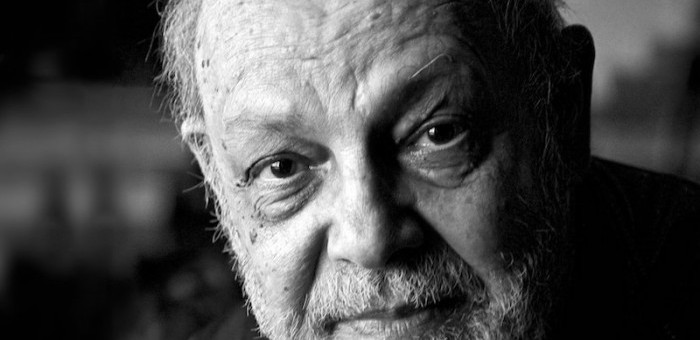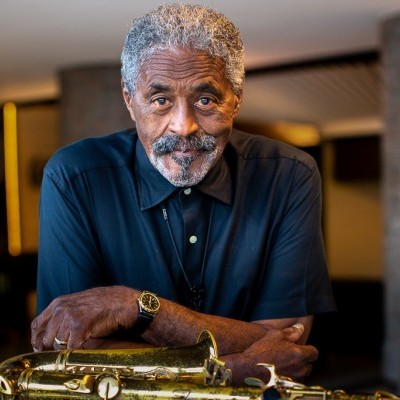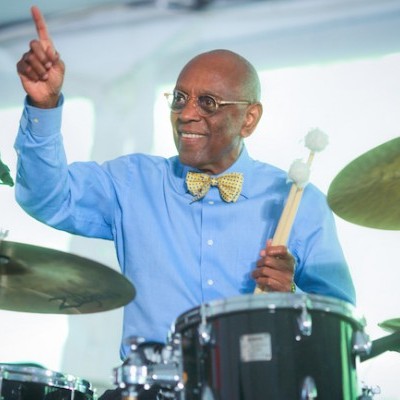Apr 2, 2024 12:59 PM
Saxophonist, Sonic Explorer Casey Benjamin Dies at 45
Casey Benjamin, the alto saxophonist, vocalist, keyboardist and producer who stamped his distinctive sounds on the…

Misha Mengelberg (1935–2017)
(Photo: Ton Mijs/Courtesy of ICP)Pianist Misha Mengelberg, a towering figure in the world of free-jazz, died in Amsterdam on March 3. He was 81.
Early in his career, Mengelberg performed with reedist Eric Dolphy (1928–’64) on June 2, 1964—a performance that was released under the title Last Date following Dolphy’s death. The drummer on that performance was Han Bennink.
In 1967, Mengelberg, Bennink and reedist Willem Breuker founded the Instant Composers Pool (ICP), a cooperative that would release their recordings and well as recordings by other free-jazz artists, including Peter Brötzmann, Steve Lacy and Derek Bailey.
Mengelberg and Bennink would frequently perform as a duo and in settings with other musicians. Among the albums in Mengelberg’s long discography are Fragments (1978, with Bennink, Bailey and John Tchicai), No Idea (1998, with Greg Cohen and Joey Baron) Four In One (2001, with Bennink, Dave Douglas and Brad Jones) and the 2005 solo album Senne Sing Song.
DownBeat contributor John Corbett profiled Mengelberg and Bennink in a May 2000 feature titled “Natural Inbuilt Contrapuncto.”
Corbett wrote: “Bennink and Mengelberg have been a team for nearly 40 years, which makes their partnership the most enduring in European free music. They’ve performed and recorded consistently as a duo, most often for their own Instant Composers Pool (ICP) label, and together they’re the core of Mengelberg’s ICP Orchestra. They’re also one of the music’s archetypal odd couples. Seven years Mengelberg’s junior, Bennink is the irrepressible powerhouse powderkeg, athletic and ruddy cheeked with stamina to spare, a raging vaudevillian with a slapstick sense of show who absolutely loves to swing. Mengelberg is the droll Dadaist tactician who cultivates the absurd, appreciates the broken and proudly describes himself as lazy, but who also has one of the keenest ears in jazz. And while he might be at pains to disavow it, Mengelberg, too, possesses a subtle, deft sense of swing.”
Over the course of a conversation moderated by Corbett, Bennink and Mengelberg agreed on a lot points, but they also had some passionate (and humorous) disagreements, illustrating their dynamic—one of tremendous mutual respect, but not always seeing eye to eye on everything. Here’s an excerpt:
John Corbett: Duo improvising is often described as a dialogue, as something where both players are having a conversation and the power relations are equal. But in a way, it’s not necessarily a dialogue, or it can be the kind of dialogue where people are talking at the same time …
Han Bennink: And still you can follow it. That’s why I like duo, because you still can follow it. With three people talking you can’t follow it anymore.
Misha Mengelberg: No, but then you have to make very quick decisions about what kind of setup you want at that point. Then people can make their own decisions about following or countering that. That happens fast. In duo, you don’t have that time of choosing positions; there is no third party that’s part of the power game. But I must say my playing has shifted over the years. You also play different, I think.
HB: I hope so. Otherwise, I’d give up, I swear.
JC: How would you say it’s different?
MM: Well, I think my idea for solo playing is somehow related to that. I have to find a space that in earlier times I was not looking for.
HB: You avoided it.
MM: I didn’t want to touch that area, because it had to do with a model of harmony, somehow, which I was not interested in. Now I like the divergences, but I also like moments of convergence. I like that to happen also. That there is a willing way of playing into a kind of harmony.
(Note: Bennink continues to tour. For information on the Instant Composers Pool, including upcoming concerts, visit the ICP website.) DB

Benjamin possessed a fluid, round sound on the alto saxophone, and he was often most recognizable by the layers of electronic effects that he put onto the instrument.
Apr 2, 2024 12:59 PM
Casey Benjamin, the alto saxophonist, vocalist, keyboardist and producer who stamped his distinctive sounds on the…

“He’s constructing intelligent musical sentences that connect seamlessly, which is the most important part of linear playing,” Charles McPherson said of alto saxophonist Sonny Red.
Feb 27, 2024 1:40 PM
“I might not have felt this way 30 to 40 years ago, but I’ve reached a point where I can hear value in what people…

Albert “Tootie” Heath (1935–2024) followed in the tradition of drummer Kenny Clarke, his idol.
Apr 5, 2024 10:28 AM
Albert “Tootie” Heath, a drummer of impeccable taste and time who was the youngest of three jazz-legend brothers…

“Both of us are quite grounded in the craft, the tradition and the harmonic sense,” Rosenwinkel said of his experience playing with Allen. “Yet I felt we shared something mystical as well.”
Mar 12, 2024 11:42 AM
“There are a few musicians you hear where, as somebody once said, the molecules in the room change. Geri was one of…

Henry Threadgill performs with Zooid at Big Ears in Knoxville, Tennessee.
Apr 9, 2024 11:30 AM
Big Ears, the annual four-day music celebration that first took place in 2009 in Knoxville, Tennessee, could well be…